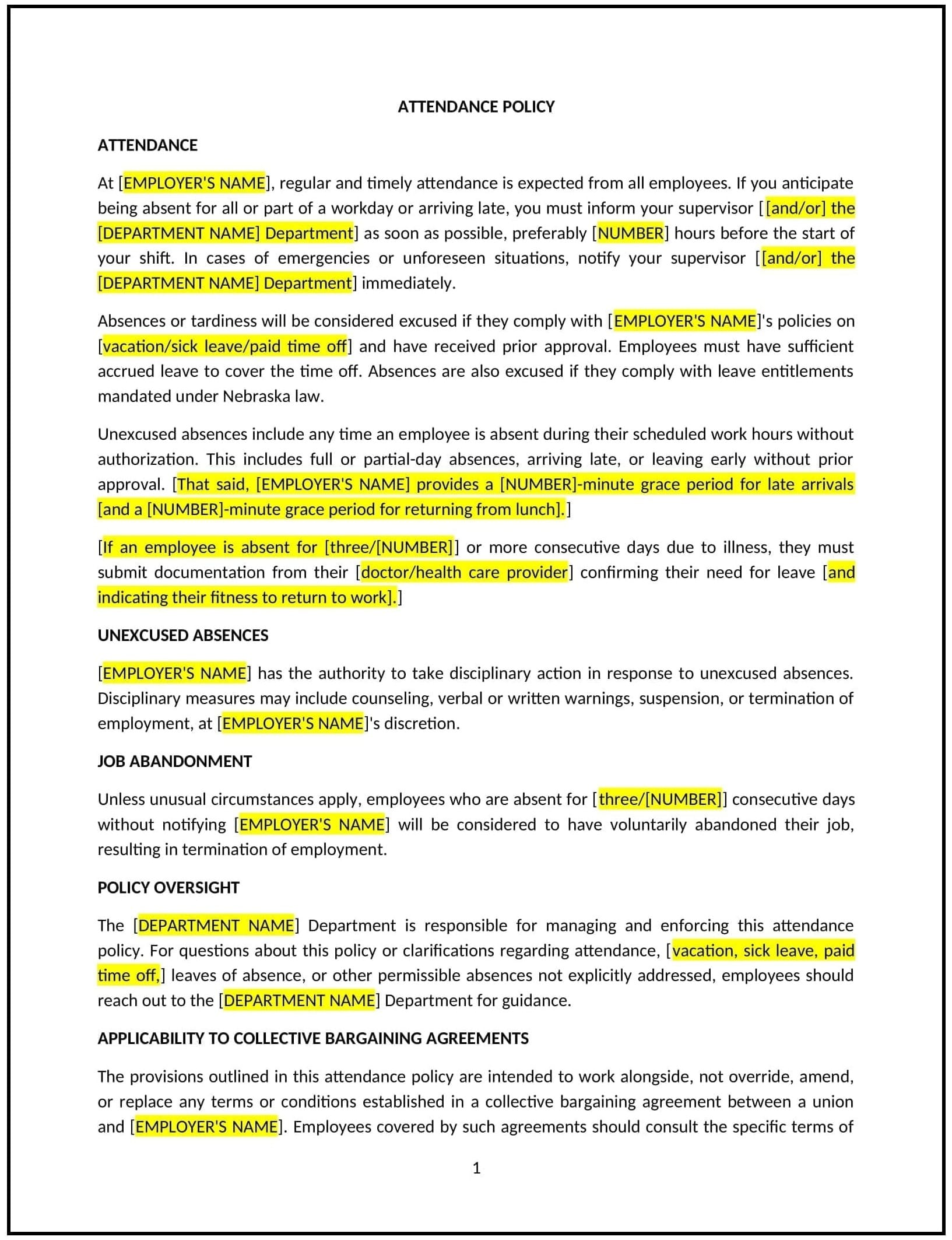Got contracts to review? While you're here for policies, let Cobrief make contract review effortless—start your free review now.

Customize this template for free
Attendance policy (Nebraska)
An attendance policy helps Nebraska businesses establish clear expectations for employee attendance, punctuality, and time-off procedures. This policy outlines the rules regarding scheduled work hours, reporting absences, and the consequences of excessive absenteeism or tardiness. It is designed to promote consistency, fairness, and accountability in the workplace, ensuring that both employees and employers understand their rights and responsibilities.
By adopting this policy, businesses in Nebraska can improve workforce productivity, minimize disruptions caused by absenteeism, and maintain a work environment where employees respect their roles and responsibilities.
How to use this attendance policy (Nebraska)
- Define expectations for attendance: Clearly specify the expected work hours, attendance requirements, and punctuality expectations for employees.
- Set reporting procedures: Establish a process for employees to report absences, including how far in advance they should notify their supervisor, what information they should provide (e.g., reason for absence), and any documentation required (such as a doctor's note for illness).
- Address types of leave: Specify the different types of leave available to employees, including paid time off (PTO), sick leave, and unpaid leave, and explain how each type of leave should be requested and managed.
- Establish consequences for absenteeism: Outline the disciplinary actions that may be taken in the event of excessive absenteeism or tardiness, such as warnings, suspension, or termination, depending on the severity and frequency of absences.
- Encourage open communication: Foster an environment where employees feel comfortable discussing attendance issues with their managers, including any personal or health-related challenges that may impact their ability to attend work.
- Monitor attendance records: Ensure that attendance records are regularly reviewed to identify patterns of absenteeism and address any issues promptly.
- Review and update: Periodically review and update the policy to ensure it reflects any changes in Nebraska labor laws, company practices, or employee needs.
Benefits of using this attendance policy (Nebraska)
This policy provides several benefits for Nebraska businesses:
- Promotes consistency: By setting clear attendance expectations, businesses ensure that employees understand their responsibilities and can consistently meet workplace demands.
- Reduces disruptions: A structured attendance policy helps minimize disruptions caused by absenteeism, ensuring that work can continue smoothly and that projects and tasks are completed on time.
- Enhances productivity: Clear attendance guidelines encourage employees to maintain regular attendance, contributing to better overall productivity and performance.
- Fosters fairness: A well-defined policy ensures that all employees are held to the same attendance standards, promoting fairness and preventing potential disputes over attendance issues.
- Supports work-life balance: By clearly outlining leave options, employees can better plan their time off, reducing the likelihood of unexpected absences and supporting a healthier work-life balance.
Tips for using this attendance policy (Nebraska)
- Communicate the policy clearly: Make sure all employees understand the expectations for attendance, how to report absences, and the consequences for violating the policy.
- Be flexible with personal needs: While maintaining clear guidelines, consider offering flexibility for employees who have valid personal or health-related reasons for needing time off, such as providing accommodations or modified hours.
- Monitor attendance patterns: Regularly track attendance records to identify trends or issues, such as frequent absences or tardiness, and address them promptly.
- Provide support for employees: Offer resources, such as employee assistance programs (EAPs), to help employees manage personal issues that may affect attendance.
- Review the policy regularly: Periodically review the policy to ensure it remains aligned with Nebraska labor laws, company needs, and evolving workplace dynamics.